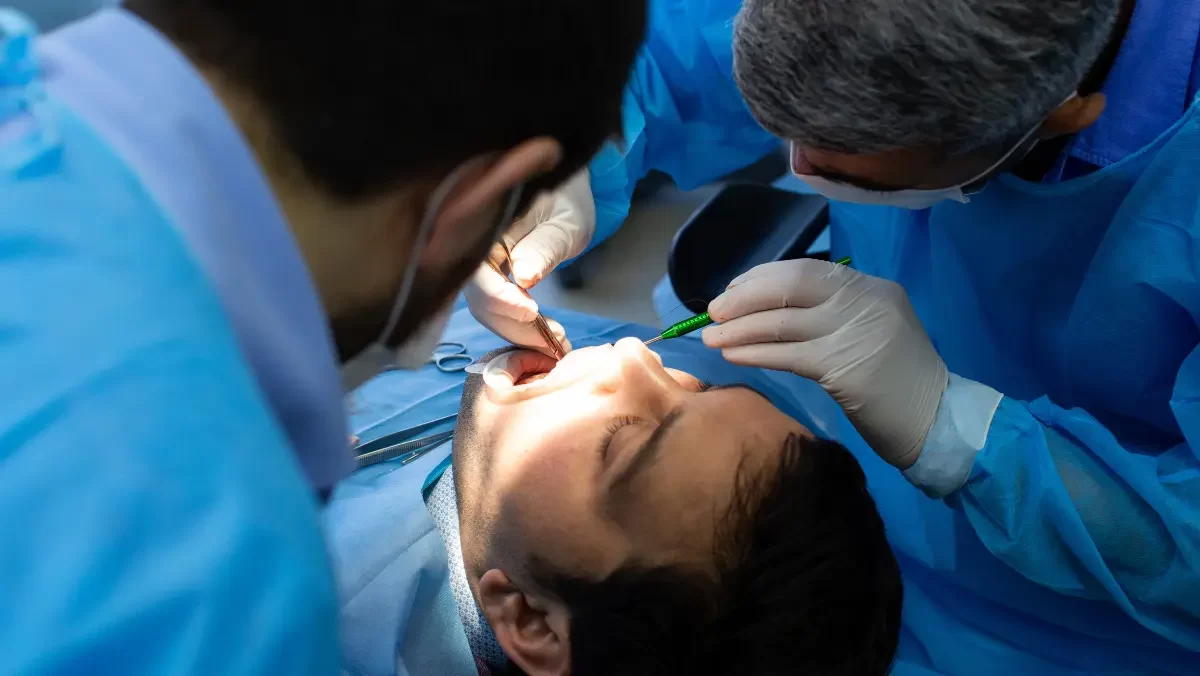Dental & oral surgery is a specialized branch of dentistry that focuses on diagnosing and treating complex conditions related to the mouth, teeth, gums, and jaw. It encompasses a wide range of procedures, from tooth extractions to corrective jaw surgeries, playing a crucial role in maintaining oral health. These surgeries help alleviate pain, restore function, and improve aesthetics. With advancements in medical technology, oral surgeries have become more precise and minimally invasive, leading to faster recovery times and improved patient outcomes. A well-executed oral surgery not only enhances overall dental health but also contributes to better overall well-being.
What is Oral Surgery?
Oral surgery is a specialized field of dentistry that involves surgical procedures to treat diseases, injuries, and defects in the mouth, jaw, and facial regions. It is performed by trained oral and maxillofacial surgeons who have expertise in managing a wide range of conditions.
- It includes procedures such as wisdom tooth extractions, dental implants, and corrective jaw surgeries, all of which address severe dental concerns that cannot be treated through non-surgical methods.
- Many oral surgeries are essential for addressing severe dental issues that cannot be managed with non-surgical treatments, ensuring long-term oral health and preventing further complications.
- The primary goal is to improve oral function, relieve pain, and restore aesthetics, ensuring long-term dental health while enhancing overall well-being and confidence in one’s smile.
Types of Oral Surgery
There are various types of oral surgeries, each addressing specific dental concerns. Understanding these procedures can help patients make informed decisions about their treatment options.
- Tooth Extraction: Removal of severely decayed or impacted teeth, such as wisdom teeth, to prevent infection, reduce pain, and avoid potential misalignment of surrounding teeth.
- Dental Implants: Placement of artificial tooth roots to support prosthetic teeth, offering a long-term solution for missing teeth that improves chewing function and maintains facial structure.
- Jaw Surgery: Also known as orthognathic surgery, it corrects misalignment and structural abnormalities of the jaw, improving both bite function and facial symmetry for a healthier and more balanced appearance.
- Gum Surgery: Treats advanced periodontal disease and helps restore gum tissue for improved oral health, reducing gum recession and preventing further damage to the teeth and supporting structures.
- Biopsy and Tumor Removal: Conducted to detect and remove abnormal growths in the oral cavity, ensuring early diagnosis and treatment of serious conditions such as oral cancer or other potentially life-threatening diseases.
Benefits of Oral Surgery
Oral surgery provides numerous benefits, enhancing both functional and aesthetic aspects of oral health. The advantages of undergoing these procedures extend beyond just improving one’s smile.
- Pain Relief: Addresses chronic pain caused by dental infections, impacted teeth, and jaw disorders, allowing patients to regain comfort and maintain a pain-free lifestyle.
- Improved Functionality: Helps with biting, chewing, and speaking by correcting dental abnormalities, making everyday activities like eating and communicating much easier and more efficient.
- Prevention of Future Issues: Eliminates problematic teeth or infections that could lead to severe complications, reducing the risk of long-term oral health problems and preventing more complex treatments in the future.
- Enhanced Aesthetic Appeal: Restores the appearance of the smile, boosting self-confidence and overall quality of life, helping individuals feel more comfortable and self-assured in social and professional settings.
- Better oral and general health reduces the risk of infections, promoting overall well-being, and decreasing conditions linked to poor oral health, including ophthalmology related complications.
Procedure
The process of oral surgery varies depending on the specific treatment, but there are standard steps involved in most procedures. Understanding what to expect can help alleviate any concerns.
- Consultation and Diagnosis: The surgeon evaluates the patient’s condition using clinical examinations and imaging techniques such as X-rays or CT scans, ensuring an accurate diagnosis and developing a personalized treatment plan.
- Anesthesia Administration: Local or general anesthesia is used to ensure a pain-free experience during the procedure, allowing the patient to remain comfortable and anxiety-free throughout the surgery.
- Surgical Intervention: The surgeon performs the necessary procedure, whether it involves extractions, implant placements, or jaw corrections, using advanced techniques to minimize discomfort and promote faster healing.
- Stitching and Dressing: In some cases, sutures are placed to aid healing, and gauze may be used to control bleeding, ensuring the surgical site is well-protected and starts healing properly.
- Post-Surgical Monitoring: Patients are observed for any immediate complications before being discharged with recovery guidelines, ensuring their safety and minimizing the risk of post-operative issues.
Recovery and Aftercare Following Oral Surgery
Proper aftercare is essential for a smooth recovery following oral surgery. Following the recommended guidelines can help prevent complications and promote faster healing.
- Pain Management: Prescribed painkillers or over-the-counter medications help manage discomfort post-surgery, ensuring that the patient can recover comfortably without unnecessary pain.
- Dietary Adjustments: Soft foods and liquids are recommended initially to prevent strain on the surgical site, allowing proper healing and reducing the risk of irritation or infection.
- Oral Hygiene Maintenance: Gentle rinsing with saline solution or prescribed mouthwash helps keep the area clean and infection-free, preventing complications and promoting faster tissue regeneration.
- Activity Restrictions: Avoiding strenuous activities and smoking aids in faster recovery and reduces the risk of complications, ensuring that healing occurs smoothly without unnecessary setbacks.
- Follow-Up Appointments: Regular visits to the dentist ensure proper healing and timely intervention if any issues arise, allowing the surgeon to monitor progress and make adjustments if necessary.
Conclusion
Dental and oral surgery plays a vital role in addressing complex dental issues, improving both oral function and overall health. Whether it’s removing impacted teeth, restoring missing teeth with implants, or correcting jaw misalignments, these procedures offer lasting benefits. By choosing the right oral surgeon and following the recommended post-operative care, patients can achieve optimal outcomes. Prime Indian Hospital is committed to providing advanced and compassionate care, ensuring the highest standard of treatment for all oral and dental surgical needs.














